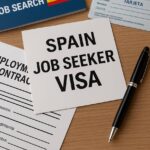Understanding Visa Rejection
Applying for a visa can be a nerve-wracking process, especially when you’ve invested time, money, and hope into your travel plans. Unfortunately, many applicants face rejection due to avoidable errors or omissions. Whether you’re applying for a tourist visa, student visa, work permit, or any other category, understanding the common mistakes can significantly increase your chances of approval.
This article outlines the top mistakes that lead to visa rejection and how to avoid them.
1. Incomplete or Incorrect Application Forms
One of the most common reasons for visa denial is submitting an application that contains missing information, inconsistencies, or outright errors.
-
What to Avoid: Skipping questions, entering false or unclear information, or making typos in names, passport numbers, or dates.
-
What to Do Instead: Double-check every detail before submitting your application. Ensure all information matches your official documents (passport, birth certificate, etc.).
If you need an explanation on writing your CV, Cover Letter and Email Template or help applying speak to Happy Face
2. Weak Proof of Financial Capability
Visa officers want assurance that you can financially support yourself during your stay abroad. Submitting insufficient or inconsistent financial documents raises red flags.
-
What to Avoid: Low or suspicious bank balances, lack of recent financial activity, or fake bank statements.
-
What to Do Instead: Provide recent, genuine bank statements covering at least 3–6 months. If someone else is sponsoring you, include an affidavit of support and proof of their financial capacity.
3. Lack of Ties to Home Country
A major reason for visa rejection — especially for tourist and student visas — is the failure to convince the consular officer that you’ll return to your home country after your visit.
-
What to Avoid: Vague plans, no job or school enrollment, no family ties, or lack of property ownership.
-
What to Do Instead: Provide strong evidence of your ties: employment letter, school admission letter, property documents, family commitments, or business ownership.
4. Inconsistent Travel History or Purpose
Discrepancies between your stated purpose of travel and your documentation can easily lead to suspicion.
-
What to Avoid: Claiming you’re traveling for tourism but submitting documents that suggest you’re job hunting or planning to stay long-term.
-
What to Do Instead: Be clear and consistent. If your purpose is tourism, show hotel bookings, an itinerary, and return flight reservations. Stick to your stated intent throughout the application and interview.
If you need an explanation on writing your CV, Cover Letter and Email Template or help applying speak to Happy Face
5. Suspicious or Fake Documents
Embassies use strict verification processes. Submitting fake documents — whether it’s a forged invitation letter, bank statement, or employment letter — is grounds for automatic rejection and possibly a long-term ban.
-
What to Avoid: Falsified paperwork or documents “doctored” to make you look more qualified or financially stable.
-
What to Do Instead: Always submit genuine documents. If you’re unsure about any requirement, consult a certified immigration adviser or the embassy’s official website.
6. Poor Visa Interview Performance
Your visa interview is your chance to convince the officer that you’re a genuine visitor or immigrant. A poor interview can ruin an otherwise solid application.
-
What to Avoid: Nervousness, giving vague or contradictory answers, memorizing a script, or lying to the officer.
-
What to Do Instead: Practice confidently explaining your travel purpose, funding, and plans. Be honest and clear. Dress appropriately and arrive early.
7. Applying for the Wrong Visa Type
Sometimes applicants unknowingly apply for the wrong visa category — for example, applying for a tourist visa while intending to attend a business conference.
-
What to Avoid: Choosing a visa type that doesn’t match your travel purpose.
-
What to Do Instead: Carefully review the visa categories and choose the one that best fits your goals. When in doubt, consult official embassy guidelines.
If you need an explanation on writing your CV, Cover Letter and Email Template or help applying speak to Happy Face
8. Previous Immigration Violations
If you’ve overstayed a visa, worked illegally, or had a deportation in the past, this can negatively impact future applications.
-
What to Avoid: Hiding or lying about your immigration history.
-
What to Do Instead: Be honest about your past, provide evidence of good conduct since, and include a letter of explanation if necessary.
9. Lack of Travel Plans or Return Ticket
Some visa types (especially tourist visas) require proof of travel arrangements and intent to return.
-
What to Avoid: Applying with no itinerary, accommodation plans, or return flight booking.
-
What to Do Instead: Provide a tentative travel plan, hotel bookings, and a return flight reservation, even if refundable.
If you need an explanation on writing your CV, Cover Letter and Email Template or help applying speak to Happy Face
10. Overconfidence or Over-Documentation
While confidence is good, overconfidence can lead to a sloppy application or a careless interview. Submitting too many irrelevant documents can also confuse or overwhelm the visa officer.
-
What to Avoid: Thinking your visa will automatically be approved or flooding your application with unnecessary papers.
-
What to Do Instead: Be respectful of the process. Submit only what’s required and make sure every document supports your story.








